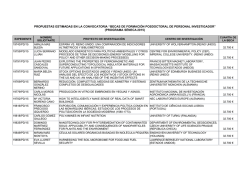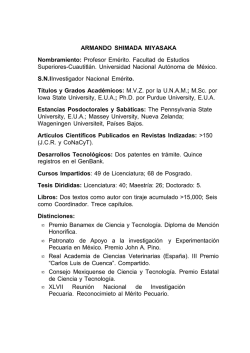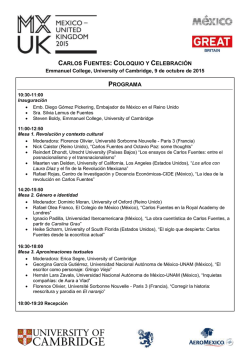
X Congreso Internacional sobre Literatura Chicana y
X Congreso Internacional sobre Literatura Chicana y Estudios Latinos Madrid - 30 de mayo-1 de junio de 2016 Facultad de Filología, Universidad Complutense de Madrid Lunes 30 de mayo de 2016 8.30 Registro 9.00-10.30 Sesión 1 Panel A: Configuraciones de la identidad cultural/nacional en tres novelas juveniles de autoras latinas: Álvarez, Cisneros y Muñoz Ryan Maria Esther Quintana Texas A&M University El viaje de la melancolía en Becoming Naomi León Andrea Fernández García Universidad de Oviedo We Are not Just Patriots of a Country, but Citizens of the Planet Malena Guerra de Charur Texas A&M University Tiempo y espacio: las casas de Mixcoac y Mango Street en las obras de Octavio Paz y Sandra Cisneros Universidade da Coruña Endangered Identities, or Lost in Translations: the Translation into Spanish of Sandra Cisneros’ "Bien pretty" and Sherman Alexie "The Search Engine" Maria del Socorro Gutiérrez Magallanes Universidad Nacional Autónoma de Mexico Leer, traducir y enseñar la obra (imágenes-ideas-pensamientos) de Gloria Anzaldúa en México Marisa Belausteguigoitia Universidad Nacional Autónoma de Mexico Borderlands/La Frontera: La nueva mestiza traducida al español Panel B: Lost in Translation Tamara Barreiro Neira Panel C: Storytelling as the Way to Resist Trauma and Marginalization Diana M. Barnes Skidmore College Chaos Finds a Voice: Resisting the (Im)position of Marginalization Through the Art of Storytelling in Ciudad Juárez and El Paso Ellen McCracken University of California, Santa Barbara “Truth in the Middle”: Trauma and Collective Family Memory in Reyna Grande’s The Distance Between Us Cinta Mesa González Universidad de Huelva In and Out: historical, transnational and literary trauma in Edwidge Danticat’s Breath, Eye, Memory and Daniel Alarcón’s At Night 10.30-11.00 Coffee Break y presentación de libros 11.00-12.30 Sesión 2 Panel A: Chicano/Latino Identity in Children's Literature Carmen González Ramos IES Cristo de Socorro Recipes for a Latina Identity: Feminist Food Politics in Children’s Literature. Eilidh Anita Bridget Hall University of East Anglia Relations in Translation: Interpreting the Family in Latina/o Children’s Books Marina Bernardo Florez Universidad Ramón Llull Representing Identity Beyond Multiculturalism in Chicano Children’s Literature: Maya Christina Gonzalez’s Picture Books Panel B: Ethnic and Marginal Experiences through Poetic Testimonios Sophia Emmanouilidou Beatriz Jiménez Villanueva Carolina Núñez-Puente TEI of the Ionian Islands Incarceration and Narrative Identity: La Pinta Poetics and the Creation of Social Imaginary Independent Scholar Amor, muerte y exilio: Una lectura a la poesía tucsonense de Carmen C. Beltrán Universidade da Coruña Against Identity: Altering Eros in Angelou, Peri Rossi, and Cisneros Panel C: Shaping Identity through Myth and Trauma Our Lady of the Lake University Chosen Glories, Chosen Traumas: Aztlán and La Malinche in Chicano Cultural Nationalist Discourse David Yagüe Universidad Complutense de Madrid La necesidad de ser contado. Autobiografía y trauma en Gloria Anzaldúa. Robert Perea University of Wyoming Las Cristas de Cd. Juárez: Journeying Toward Resurrection Ezequiel Peña Panel D: Recovering Forgotten Pieces: Origins and Heritage Manuel M. Martín Rodríguez University of California, Merced Paper Trails: Recovering Chicano Popular Poetry from the (Early) 20th Century Aida Roldán García University of Massachusetts, Amherst Heroínas de frontera: resistencia femenina y sentimentalismo histórico en Caballero: A Historical Novel Mario T. García University of California, Santa Barbara The Mexican-American Search for Identity: Ruben Salazar's Unpublished Novel, A Stranger's House Ceremonia inaugural 12.45 Entrega del II Galardón D. Luis Leal al profesor Gary Francisco Keller Conferencia plenaria: Gary Francisco Keller - "Biculturalism and Neoculturation in Chican@ Art" 14.30 Vino español 16.00-18.00 Sesión 3 Panel A: Conflicto de identidades, discursos de exclusión y planteamientos identitarios Lisbeth Souza-Fuertes Baylor University Conflicto de identidades, aculturación y cultura popular en la novela Pocho, de José Antonio Villarreal University of California, Merced The Los Angeles Spanish-Language Crónica: Epistemicide and the Decolonial Making of Urban Latina/o Subjectivities Manuel García-Castellón University of New Orleans Bandido en la trilogía Zoot Suit de Luís Valdez: el proscrito y su épica de resistencia Roberto Fuertes-Manjón Midwestern State University Discurso de exclusión, carácter testimonial y afirmación identitaria en Between Two Worlds , de Américo Paredes Ignacio López-Calvo Panel B: Building Identity in Social Spaces through Poetry and other Artistic Expressions Esther Álvarez Beatriz Badikian-Gartler Universidad de Oviedo Nuyorican Women's Poetry in Place: Social Space, Alternative Knowledge, and the Multicultural Self Independent Scholar Emergency Poems/poemas de urgencia: Latino Poetry in Chicago - 1970s and 1980s California Institute of Integral Studies Flamenco in The USA and the Andalusian-American Poet Universidade da Coruña Spindling Threads of Folklore: Past and Present in Son Jarocho Musical Heritage Nicole Henares Rebecca Gutierrez Panel C: Jotería Studies en Movimiento: Building and Unveiling Our Legacies Rigoberto González Ernesto Javier Martínez Daniel Enrique Pérez William A. Calvo Quirós Xamuel Bañales Rutgers University Erotic Light, Amor Oscuro: On the Queer Poetics of Francisco X. Alarcón and His Muse, Federico García Lorca University of Oregon Phenomenology of the Raised Flesh University of Nevada, Reno Jotería Legacies: Queer Chicano Cultural Production as a Cultural Heritage Site University of Michigan Waves of Mariposa History: Jot@ Genealogies of Affirmation Rutgers University Activismo de Jotería: un proyecto descolonizador en EEUU Panel D: Extrapolations from Chicano Narrative to Contemporary European Issues Eric Bergman Daniel Schreiner University of Helsinki Possible Extrapolation from the Chicano/a Migration Narrative in Estela Portillo Trambley’s Trini to the Current European Refugee Situation University of Bonn German Xenophobia through the Mexican-American Lens: From the Zoot Suit Riots to Post“Cologne“ism Political Aspects of Chicano History Ben Olguin University of Texas at San Antonio Chicana/o Internationalisms: Chicana/o Anarchists and Communists from the Mexican Revolution to the Spanish Civil War to the Decolonial Present Phillip B. Gonzales University of New Mexico Anti-Semitism on the Frontier: The 1867 Election for Delegate to Congress from the New Mexico Territory Panel E: Prostitutes, Bandits, and Food: The New Mestiza Identities Cristina Sisk University of Houston The Bandit Hero Goes Global: Rethinking the Limits of Cultural Nationalism Sarah Luna University of Houston “Veracruzanas are Worse than Prostitutes”: Racialized Sexuality and Regional Distinctions in a Mexican Border City, 2008–2009 Maria C. González University of Houston Gloria Anzaldúa and the Construction of the New Mestiza Elizabeth Rodriguez Kessler University of Houston Latin@s in the Kitchen: Food for the Dead and Las Nuevas Tamaleras Martes 31 de mayo de 2016 9.00-10.30 Sesión 1 Panel A: Representaciones de la metamorfosis identitaria Universidad Complutense de Madrid Masculinidad en el cine chicano: de las políticas del esencialismo a las poéticas del realismo Erin Amason Montero Warren Wilson College Mariposas, putas y mujeres abnegadas in Butterfly Boy : Memoirs of a Chicano Mariposa Catherine Leen National University of Ireland Maynooth “There’s no Place Like Home:” Dan Guerrero’s ¡Gaytino! and Panti Bliss: The Queen of Ireland CETAPS How Can Anzaldúa's Work Forge a Paradigm Shift in Foreign Language Classes? A Sociocultural Approach for the XXI Century Università di Sassari Language and Mestizo Identity in Carlos Morton's Plays and their Translations Texas A&M University The Bilingual Barrier to Bicultural Chicano Projects: The Case of Hinojosa Juan González Etxeberria Panel B: Language: Barrier or Bridge Patrícia Alves Lobo Elena Errico Stephen Miller Panel C: The Identity Journey of the Latino Girl Johnson C. Smith University De cómo las muchachas García perdieron más que su acento: la sustitución de valores al hablar inglés en la novela de Julia Álvarez Universidad Complutense de Madrid Interculturality Interrupted: Judith Ortiz Cofer's The Latin Deli Universidad de Maroua Mutismo de la mujer desde la niñez en Bailando en silencio: escenas de una niñez puertorriqueña (1997) de Ortiz Cofer Mario Bahena Uriostegui Francisco José Cortés Vieco Habiba Dalailou Panel D: Migration Experiences and Racial Identity Sara Aguirre University of California, San Diego Victor Villaseñor and His Novels: Racial Formation, Discrimination, and the American Southwest Aishih Wehbe-Herrera Universitat de Barcelona Transnational Masculinity Politics in Junot Diaz's The Brief Wondrous Life of Oscar Wao Manuel de Jesús Hernández Arizona State University Migración e identidad en las novelas chicanas sobre la Revolución Mexicana 10.30-11.00 Coffee Break y presentación de libros 11.00-12.30 Sesión 2 Panel A: Identity Construction in Sandra Cisneros Antonio Daniel Juan Rubio Isabel María García Conesa María Herrera-Sobek Paloma Fernández Sánchez Centro Universitario de la Defensa de San Javier La creación de la identidad chicana a través de las obras de Sandra Cisneros University of California, Santa Barbara The Nature of Memory: Sandra Cisneros' Theoretical Formulations of Memory, Fiction, and Story in A House of My Own Columbia College SC Hispanic Fairy Tales: Cinderella in Sandra Cisneros' The House on Mango Street Panel B: Reinterpretación del mito en la literatura chicana Maricela Becerra Garcia University of California, Los Angeles Ni virgen ni puta: Un nuevo ideal femenino a través de Sandra Cisneros, John Rechy y Alma López José Flores Arizona State University Cargando con su cruz: erotismo y espiritualidad transgresora en poemas De amor oscuro Universidad de La Laguna “(Re/Mis)Appropriations of La Malinche in the Chicana/o Contemporary Cultural Scene” Juan-Ignacio Oliva-Cruz Panel C: Identidad y comunidad en la obra de Oscar Zeta Acosta Universidad Complutense de Madrid In search for (Postmodern) Identity in Óscar Zeta Acosta’s The Revolt of the Cockroach People José Juan Gómez-Becerra Arizona State University Al son de las cucarachas: el simbolismo de las cucarachas en The Revolt of the Cockroach People de Oscar Zeta Acosta como metáfora insurrecta Laura Muñoz University of California, Los Angeles From East Oakland to East LA: Searching for the Brown Buffalo Université de la Sorbonne Nouvelle Entre Nuevo-México, EEUU y España, itinerario del pintor Frederico Vigil, talentoso y comprometido fresquista nuevo-mexicano. New Mexico Highlands University Identidad y otros temas de tres escritores nuevomexicanos University of Notre Dame Aurelio M. Espinosa: Folklore, Spain and the Catholic Church In the US Southwest Elsa del Campo Ramírez Panel D: Orígenes e identidad latina Annick Treguer Walter R. Archuleta José E. Limón 12.45 Conferencia Plenaria: María Dueñas - "Ficción y memoria en la novela Misión Olvido " 15.30-17.00 Sesión 3 Panel A: Identity Transformation in Chicano Literature Central Michigan University El libro de los americanos desconocidos de Cristina Henríquez y La distancia entre nosotros de Reyna Grande: testimonio de la marginación y exclusión social en la nueva literatura latin@ University of Washington Prickly Politics and “Becoming” Chicana in Palacio's Ocotillo Dreams University of California, Santa Barbara Storytelling as Transformation: Disrupting Cycles of Violence through Feminist Sites of Remembrance, Love, and Forgiveness in Emma Pérez’s Forgetting the Alamo, Or, Blood Memory Alejandro Ramirez Mendez University of California, Los Angeles Hyper-aesthetics of the Greater Mexico: Hector Calderón’s Narratives of the Greater Mexico and the Hyperaesthetics of the border culture Maria Antònia Oliver Rotger Universitat Pompeu Fabra The Poetics and Politics of Unrepentant Border Crossing: Luis Humberto Crosthwaite's Instrucciones para cruzar la frontera and Santiago Vaquera Let Me Tell You the Things I've Seen DeSales University Imaginería religiosa de la frontera Alejandra Rengifo Vanessa de Veritch Woodside Adrianna Simone Panel B: Border Culture Angélica Silva Panel C: Mujer protagonista de la literatura chicana California State University, Channel Islands De heterotopías y utopías en Waiting to Happen de Alejandro Morales University of WisconsinMilwaukee Letters of Freedom in Virginia Sanchez Korrol’s Feminist and Abolitionist: The Story of Emilia Casanova EOI Viveiro (Lugo) Poesía y pintura de Raquel Valle Sentíes: filiaciones estéticas comprometidas Universidad Complutense de Madrid The New Mordor: Dominican-American Identity and the Reconstruction of the "Other" In Junot Diaz´s The Brief Wondrous Life of Oscar Wao Katarzyna Nowak-McNeice Universidad Carlos III de Madrid Non-Places in California: Hector Tobar's and Tim Z. Hernandez's Literary Interventions Georges Moukouti Onguedou Universidad de Maroua Fracaso o éxito en las narraciones de inmigración hispana en Estados Unidos ¿Una cuestión de victimismo o de hispanomorfosis? Margarita López López Nancy Bird Soto María Jesús Castro Dopacio Panel D: Ethnic and Literary Spaces Maria Laura Arce Álvarez 17.00-19.00 Sesión 4 Panel A: Imagining the Borderlands. Readings by La Frontera Writers María Herrera-Sobek University of California, Santa Barbara The Desert Speaks: Heartscapes from La Frontera Tey Diana Rebolledo University of New Mexico La Llorona on the Bridge Street Bridge - A Reading Universtiy of Missouri, Kansas City A Reading of Poetry and Prose Josebe Martínez Gutiérrez Universidad del País Vasco Becoming Chicana: Queering Identities Against Femicide / Deviniendo chicana: Identidades queer contra el feminicidio en Ciudad final María Luisa de la Garza Universidad de Ciencias y Artes de Chiapas Nuevas y viejas formas de representar la institucionalidad norteamericana en la producción reciente de corridos Norma Elia Cantú Panel B: Espiritualidad y símbolos de la subjetividad femenina hispana Steffanie Fetta Syracuse University Communion through Death in Elaine Romero's Walking Home University of California, Los Angeles Spring is for me! La representación floral en The Miraculous Day of Amalia Gómez Icess Fernandez Lone Star College/San Jacinto College What is a Latina? Afro-Latinas, Identity and Redefining the Narrative in the US Carolina Fernández Rodríguez Universidad de Oviedo Pushing the Boundaries of Latino Identity: The Case of Danzy Senna Maria Teresa Monroe Stories of Multiheritage Panel C: Literary and Cinematographic Contributions to Feminine Identity Construction Daisy Herrera California State University, Los Angeles Clémentine Ngo Mbeb Universidad de Maroua Monica Got University of Bucharest Romana Radlwimmer University of Missouri, Kansas City ¡Yo Soy Chicana! Identity and Historical Themes and Lessons in the Works of Graciela Limón Ecos de nuevas identidades femeninas en Canícula de Norma Elia Cantú y El País de las mujeres de Gioconda Belli. Trauma All Across the Borderlands: Canvassing Ideologically Motivated Violence Against Women in Contemporary Chicana Novels Exuberantes o abstractas / Todas las latinas, cinematográficamente Panel D: The Making of Chican@ Personae Francisco A. Lomelí University of California, Santa Barbara Juan Felipe Herrera: The Making of a Poet Laureate María Socorro Tabuenca C. University of Texas at El Paso Norma Cantú: From the Barrio to intelectual pública Perspectivas españolas de la literatura chicana: Ensayos literarios y culturales 20.30 Jesús Rosales Arizona State University Vanessa Fonseca University of Wyoming Cena del Congreso Perspectivas españolas de la literatura chicana: Ensayos literarios y culturales: críticos españoles de acá (los Estados Unidos) Perspectivas españolas de la literatura chicana: Ensayos literarios y culturales: críticos españoles de allá (España/Europa) Miércoles 1 de junio de 2016 9.00-10.30 Sesión 1 Panel A: La frontera y los fronterizos: Border Identities Grazyna Zygaldo University of Lodz, Poland Nos/Otras Living in Nepantla – Gloria Anzaldúa and her Concepts of Borderlands Identity St. Mary's University Popular Border Culture: From the “Lazy Mexican” to the Frito Bandito Universidad del País Vasco The Bridge , el puente, Bron: la frontera y su representación en The Bridge (HBO) Christian Yanaí Bermúdez University of California, Los Angeles Telenovelas and Feminine Subjectivity in Sandra Cisneros: Influence of the Melodramatic Discourse in the Characters of "Bien Pretty" and "Woman Hollering Creek" María Olga Luna Estévez Universidad Alfonso X El Sabio El humor en el teatro de autoras chicanas como proceso de reconstrucción de la identidad femenina Aida Roldan García University of Massachusetts Amherst "Señoritas" of the New Millenium: Etnicidad, Género y Nuevas Feminidades en la Chica Lit Ito Romo Amaia Ibarraran Panel B: Nuevas feminidades Panel C: Latino Panethnic Voice and Power Ramón Gutiérrez University of Chicago The Origins of Latino/a Panethnicity in the United States Lilia Fernandez The Ohio State University Columbus Campus Forming a Latino Constituency: The Origins of Panethnic Politics Theresa Torres University of MissouriKansas City The Chicana and The Mayor Panel D: Fleshing the Spirit, Spiriting the Flesh: Discussions on Spirit, Spirituality and Spiritual Activism in Chicana Studies Eastern Washington University Complicating the Food Movement: Viramontes’s Spiritual Activism in Under the Feet of Jesus Irene Lara California State University, San Diego Sensing the Serpent in the Mother, Dando a Luz la Madre Serpiente: Chicana Spirituality, Sexuality, and Mamihood Elisa Facio Eastern Washington University Spirit Journey: 'Home' as a Site for Healing and Transformation Norma Cardenas 10.30-11.00 Coffee Break y presentación de libros 11.00-12.30 Sesión 2 Panel A: "El Mexico de Afuera" en la contrucción identitaria Víctor Barrera Enderle Universidad Autónoma de Nuevo León La Revista Mexicana, de Nemesio García Naranjo y la construcción identitaria mexicana de los desterrados políticos en Estados Unidos Nora Lizet Castillo Aguirre Universidad Autónoma de Nuevo León La construcción de la identidad mexicana en las editoriales de Loreley Roberto Kaput Gonzalez Santos Universidad Autónoma de Nuevo León El México de Afuera como discurso identitario Panel B: Radical Freaks and "Bad Women". Chicana Feminist Deconstructions of Cultural Myths and Icons Charlene Villaseñor Black University of California, Los Angeles A Chicana Art Historian Considers Sor Juana and the Dangers of Intellectual Desire Alma Lopez University of California, Los Angeles The Freaky Story of Julia Pastrana: Sinaloa's Most Famous Bearded Daughter Universidad de California, Los Angeles Radical Freaks and "Bad Women". Chicana Feminist Deconstructions of Cultural Myths and Icons Alicia Gaspar de Alba Panel C: Soundtrack and Representations of a Chicano Generation Mara González de Ozaeta Universidad Complutense de Madrid Latinas, Punk Music and Their Rage Stories Texas A&M University Profane Stories - Love and Rockets and Chicano Representation of Women in the Alternative Comics in the Eighties University of New Mexico Gimme Something Better: A Playlist for Chicano/a Punk Pablo Reyes-Sariñana Santiago Vaquera-Vásquez Panel D: Voices of Discontent: Identity Issues and Community Consciousness Natalia Villanueva Nieves University of California Santa Barbara Discursive Crimes: An Affective Heteroglossia vs. Systemic Rhetoric in Eulogy for a Brown Angel by Lucha Corpi Beykoz University Multicultural and Historical Background of Contemporary Chicano/a Theatre KTH Royal Institute of Technology “VARRIO SI, YONQUES NO”: Urban and Rural Socio-Environmental Struggles in Chicano Corridos, Artivism and Crafts Aycan Gürlüyer María Isabel Pérez Ramos 12.45 Conferencia Plenaria: Reyna Grande 15.30-17.30 Sesión 3 Panel A: Capitalismo, injusticia social y activismo en la novela chicana Maite Aperribay Bermejo Universidad del País Vasco Heroes and Saints & Other Plays : una lectura ecofeminista de la obra de Moraga Ylce Irizarry University of South Florida, Tampa Los Moon Rakers: (Re)Volution as Identity in the New Chican@ Movement El camino y el destino: Migrants Narrative Donfack Sounna Anicet Arturo Zepeda Universidad de Maroua El norte de Gregory Nava y A Better Life de Chris Weitz: Representaciones ideológicas de la inmigración hispana en Estados Unidos California State University, Los Angeles Seeking for the Immigrant Voice in Chicano Fiction; Magical Realism and the Untold Migration Stories of the Southwestern Borderlands Panel B: New Approaches in Alzandúan Studies: Re-Framing Identities Trinity University (San Antonio, TX) Chican@ (Im)migrant Voices: Memoir and Anzaldúan Theory in the Writings of Reyna Grande and Rigoberto González George Mason University Queerness, vulnerabilidad y empoderamiento personal y colectivo en Gloria Anzaldúa y Judith Butler Romana Radlwimmer University of Missouri, Kansas City El archivo, procesos editoriales, políticas representacionales Norma Elia Cantú Universtiy of Missouri, Kansas City Poetas Nepantleras: An Anzaldúa Border Studies Approach to the Poetry of Contemporary Tejana Poets Rita E. Urquijo-Ruiz Ricardo F. Vivancos-Pérez Panel C: Prácticas confrontacionales y expresiones de odio hacia la población de origen mexicano en los Estados Unidos (1848-1950) Miriam Bornstein Gómez University of Denver El reverso de la mirada: Acercamiento teórico al discurso visual y escrito sobre la violencia en contra de los mexicanos (1848-1950) Armando Miguélez Academic Language Institute Abroad La expresión épica en el ciclo de Joaquín Murrieta Fernando Tapia Grijalva Oscar U. Somoza Universidad de Sonora, México University of Denver Normas jurídicas documentadas en la prensa escrita en español, durante el período de 1848 a 1950, y utilizadas como instrumentos de dominación angloamericana contra la comunidad mexicoamericana Representaciones periodísticas y artísticas de la violencia institucionalizada contra los residentes de origen mexicano en los Estados Unidos a partir de 1848 Panel D: Origen y exilio: espacios de creación de identidad Babloo Ram Alicia Ramos Jordan Daniel Vargas Minervi Ines E. Veauthier Jawaharlal Nehru University Question of Origin in Rudolfo Anaya’s Bless me, Ultima Trinity College, University of Cambridge Paletitas de guayaba: Viaje hacía una (de) construcción identitaria Arizona State University Objetos exiliados: la isla vía la grafía de Floreal Hernández University of Mainz Home is Where the Heart is: the Search for Identity in Chicano Literature University of North Carolina Reading from All the Agents & Saints: Dispatches from the U.S. Borderlands University of New Mexico Selections from Short Stories in English and Spanish University of New Hampshire New Fiction Reading 17.00-19.00 Sesión 4 Panel A: Trends in Creative Writing Stephanie Elizondo Griest Santiago Vaquera-Vásquez Charli Valdez Panel B: Exploring Latin@s - Case Studies Maria Luisa Zamudio Mainou Illinois State University Validating Culturally Responsive Teaching: The Keystone of Success for Latinos in Higher Education University of South Florida The Interconnected Experience of Identify and Survival: Narratives of Colombian, Mexican and Puerto Rican Women with a Cancer Diagnose Joseph Morales University of California, Irvine Historicizing Digitization: Lucha Corpi and the Chicano Database Víctor M. Valle California Polytechnic State University L.A.'s Latina/o Phantom Nonfiction and the Technologies of Literary Secrecy Iraida V. Carrion Literary Technologies Panel C: Reflexiones en torno al lenguaje y al léxico Cara Kinnally Gabriel Meléndez John Nieto-Phillips Jesús Eloy Villar Argáiz 19.00 Clausura del congreso Purdue University Color-Blindness and the Racialization of Spanish in Héctor Tobar’s The Barbarian Nurseries University of New Mexico The Possible Past and Possible Future of a Borderlands Literary and Cultural Episteme Indiana University, Bloomington War of the Accents: Competing Hispanisms and Global Cinema, from the Silent Era to the Age of the Talkies Universidad de Granada Aproximación temática a “Peregrinos de Aztlán ” y “El Sueño de Santa María de las Piedras ” de Miguel Méndez apoyado en parámetros léxicos
© Copyright 2026




